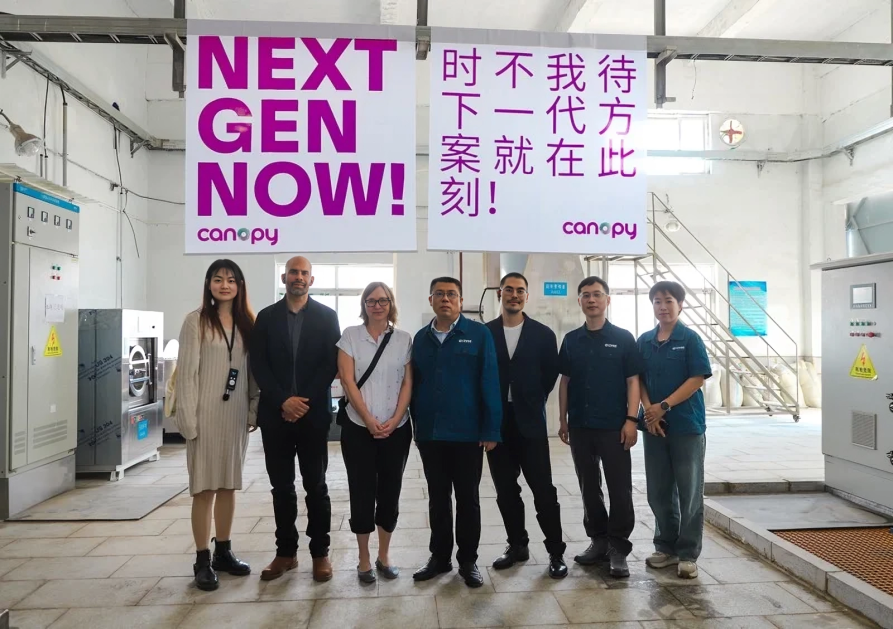Tangshan Sanyou, a global leader in man-made cellulosic fibres (MMCF), has officially launched a pilot line for its cutting-edge ReVisco fibre technology. This state-of-the-art facility is a major leap toward circular textile production, designed to convert post-consumer cotton textile waste into high-quality viscose fibres, redefining the future of sustainable textiles.
The facility, located within Tangshan Sanyou’s sprawling industrial complex in Hebei Province, leverages innovative chemical recycling processes to recover cellulose from discarded textiles. By transforming waste materials into new fibres, the company is addressing both environmental concerns and resource efficiency—key pillars in the textile industry’s drive toward sustainability.
The ReVisco Process
The ReVisco process is a proprietary technology developed by Tangshan Sanyou’s R&D team. It involves a multi-stage approach:
- Cotton Waste Sourcing: Post-consumer cotton textiles, often destined for landfills, are collected and pre-treated.
- Cellulose Recovery: Through chemical processing, high-purity cellulose is extracted while minimizing the use of harsh chemicals and reducing emissions.
- Fibre Spinning: The recovered cellulose is spun into viscose fibres with mechanical properties comparable to virgin fibres, ensuring no compromise on quality.
- Quality Assurance: Rigorous testing guarantees that ReVisco fibres meet industry standards for strength, dyeability, and sustainability.
Environmental Impact
According to Tangshan Sanyou, the pilot line has the capacity to process approximately 10,000 tonnes of cotton waste annually, resulting in a substantial reduction of textile landfill contributions. Moreover, the chemical recycling process consumes significantly less water and energy than conventional methods, aligning with the United Nations’ Sustainable Development Goals (SDGs) on responsible consumption and production.
A spokesperson for the company emphasized the long-term vision:
“ReVisco is more than just a fibre innovation; it’s a commitment to closing the loop in textile production. By integrating waste back into the supply chain, we are setting a precedent for a truly circular economy.”
Industry Collaboration
Tangshan Sanyou is collaborating with major fashion brands and textile mills to test and integrate ReVisco fibres into mainstream production. Initial trials have shown promising results in denim, knitwear, and home textiles. The company is also partnering with local governments and NGOs to expand textile waste collection networks, ensuring a steady supply of raw materials for scaling up operations.
Challenges and Opportunities
While the pilot line marks a significant milestone, Tangshan Sanyou acknowledges the challenges ahead. These include establishing standardized sorting processes for textile waste, developing scalable logistics for waste collection, and overcoming market skepticism regarding recycled materials’ performance.
However, with growing consumer demand for sustainable fashion and increasing regulatory pressure to reduce textile waste, the company is confident in the commercial viability of ReVisco. Industry experts predict that such technologies will play a pivotal role in helping brands meet circularity targets and reduce reliance on virgin fibres.
Global Implications
Tangshan Sanyou’s initiative has drawn attention from stakeholders across the globe. Environmental advocates, industry leaders, and policymakers view ReVisco as a blueprint for sustainable manufacturing. Its success could inspire similar innovations in other regions, contributing to a global shift toward circular textile economies.
Looking Ahead
With the pilot line now operational, Tangshan Sanyou plans to scale up production capacity over the next three years. The company aims to establish full-scale commercial facilities capable of processing over 100,000 tonnes of textile waste annually. This expansion could position Tangshan Sanyou as a global frontrunner in recycled MMCF technology.
